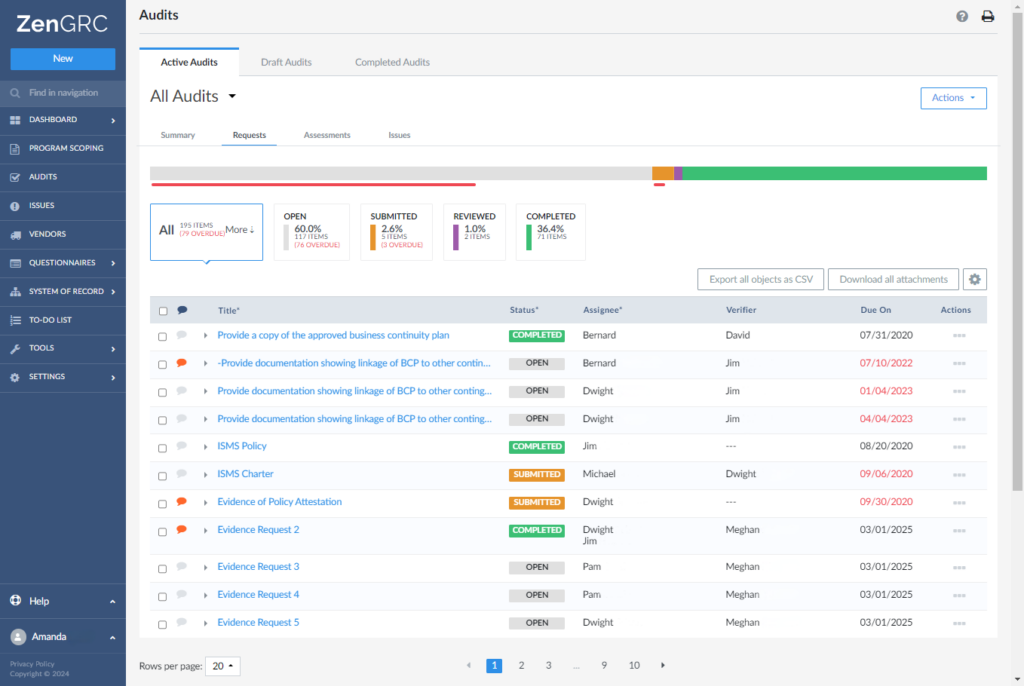COSO Compliance
Software & Management
What Is COSO Compliance?
The Committee of Sponsoring Organizations (COSO) is a group that publishes various risk management frameworks, including its widely used framework for internal business controls.
That framework helps organizations to assure that their financial statements are accurate, that assets and stakeholders are protected from fraud, and that their operations are running optimally. Its guidelines are applicable across the entire organization, from auditing to IT.
COSO publishes other risk management frameworks as well; we are focusing here specifically on its internal control framework, last updated in 2013. That framework was originally created by five private sector organizations, including:
- The American Institute of Certified Public Accountants (AICPA)
- The National Association of Accountants (now the Institute of Management Accountants (IMA)
- The American Accounting Association (AAA)
- The Institute of Internal Auditors (IIA)
- Financial Executives International (FEI)
COSO’s internal control framework is the most widely used framework for internal controls in the United States. It helps businesses to demonstrate their compliance with laws and regulations such as Sarbanes-Oxley Act (SOX) and the Foreign Corrupt Practices Act (FCPA).
While the COSO internal control framework is voluntary, its guidelines can help to empower your organization with the security infrastructure necessary to prevent fraud, theft, reputational loss, or regulatory enforcement over poor controls.

Why Is COSO Compliance Important?
The COSO framework has been instrumental in deterring fraud and poor financial reporting among U.S.-listed public companies. Indeed, the framework provided the first formal definition of the term “internal control.”
COSO defines internal control as “a process, effected by an entity’s board of directors, management, and other personnel; designed to provide reasonable assurance regarding the achievement of objectives relating to operations, reporting, and compliance.”
COSO’s description of internal controls is an important foundation for modern cybersecurity management, because it established internal controls as a process that achieves something, rather than as a goal unto themselves. The framework has empowered many organizations across a variety of industries to improve decision-making, operational, reporting, and compliance protocols.
Another important benefit of COSO is that it has allowed corporate compliance professionals to give senior management the confidence that operations are effective and efficient, financial reporting is accurate and accountable, and compliance with all applicable laws is assured.
COSO Requirements at a Glance





COSO Compliance Checklist
The following checklist can help serve as a COSO guide as you begin to implement your own internal controls.
| 1 | Implement an ethics program that enforces integrity and ethical values in business practices. |
| 2 | Make a commitment to monitor enforcement of your risk management framework. |
| 3 | Facilitate management’s philosophy on ethical business operations. |
| 4 | Determine your organizational structure. |
| 5 | Assign appropriate authority and responsibility according to your organizational structure. |
| 6 | Determine enterprise risk management objectives. |
| 7 | Perform an internal audit to determine risk appetite and risk tolerance. |
| 8 | Implement an appropriate change management protocol. |
| 9 | Continuously improve security as new guidance is received or as regulations change. |
| 10 | Create a business continuity plan. |
| 11 | Implement effective internal control monitoring activities. |
| 12 | Report deficiencies and implement improvements. |
COSO Compliance Made Easy with ZenGRC
Pre-Built Templates, Automated Audits, and Real-Time Monitoring to Ensure Compliance with COSO
Our ZenGRC team can walk you through the entire COSO framework, helping you examine your environment and policies and shore them up to ensure a robust compliance program.
We can also advise on documentation best practices and a system of internal controls that includes your COSO framework as well as any other necessary frameworks like SOC2, HIPAA, PCI, or otherwise.
Using our flexible, integrated ZenGRC to organize and manage COSO suggestions, our solution eliminates many of the tedious manual processes and reduces the time and resources requirements to manage an effective compliance program.
ZenGRC COSO Capabilities
- User-friendly dashboard with real-time metrics on prioritized risks
- Pre-built evidence request templates can help streamline and execute internal audits
- A central repository for COSO compliance documentation
- Cross control framework mapping for ISO, PCI, GDPR, NIST, and more
- Interconnectivity between threats, vulnerabilities, risks, and controls for greater insight and monitoring
- Complete Risk Management functionality for assessments, scoring, and treatment throughout the risk lifecycle

FAQs about COSO
Is COSO mandatory?
No, but most parties — including regulators such as the U.S. Justice Department and the Securities & Exchange Commission — consider use of the COSO internal control framework to be a crucial step for compliance with SOX and the FCPA. And those laws are mandatory.
What is an internal control framework?
COSO defines internal control as ‘a process, effected by an entity’s board of directors, management, and other personnel; designed to provide reasonable assurance regarding the achievement of objectives relating to operations, reporting, and compliance.
What are the five components of COSO internal control?
The five components of the COSO internal control framework are risk assessment, control activities, information and communication, control environment, and monitoring.
What is a COSO internal control questionnaire?
A COSO internal control questionnaire is a document auditors use to help determine an organization’s compliance with internal control system requirements issued by COSO Internal Control-Integrated Framework.
What is COSO guidance for healthcare providers?
The COSO Internal Control-Integrated Framework: An Implementation Guide for the Healthcare Provider Industry, was published in 2013 by COSO in collaboration with professional services firm Crowe and CommonSpirit Health.
The guide is meant to help healthcare businesses address subjects such as access control, system integrity, clinical documentation, coding, and billing procedures. COSO’s guidance provides an outline of best practices for meeting those requirements.
